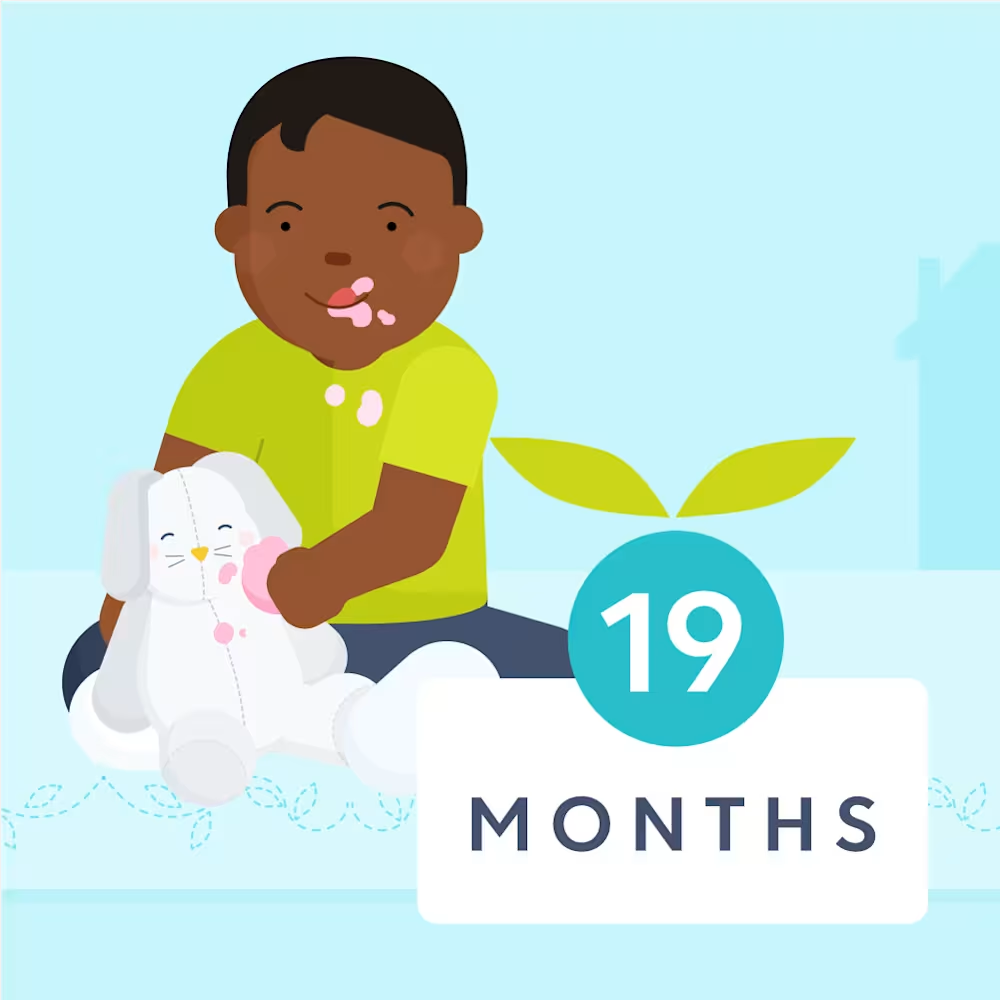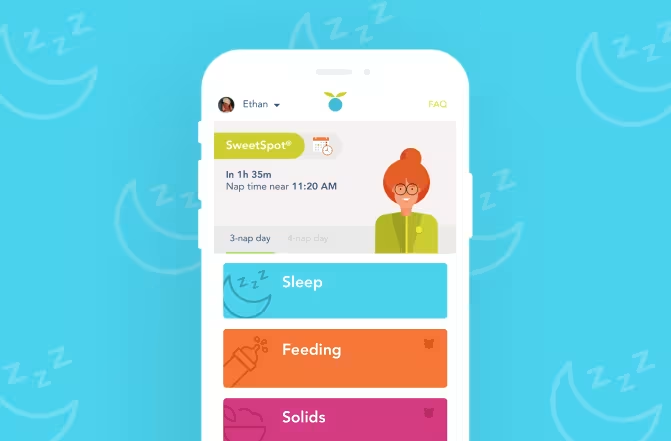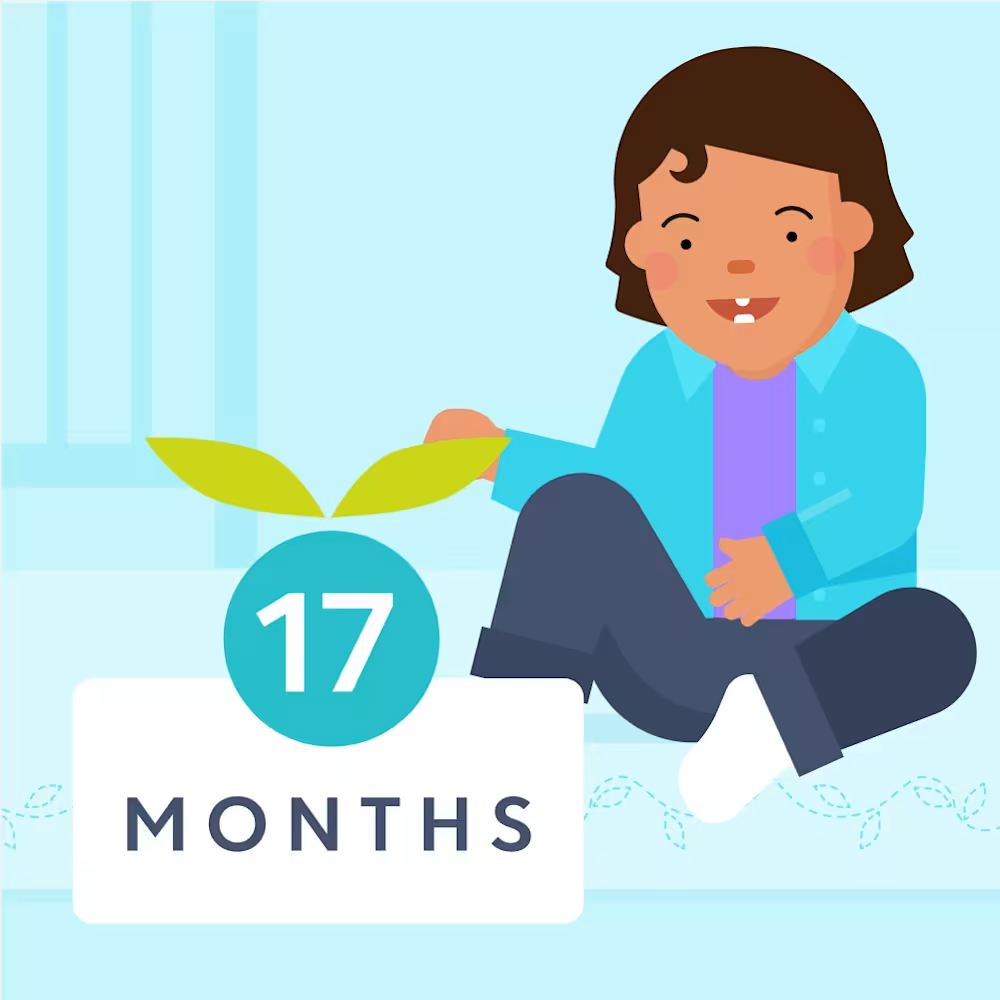18 month old sleep schedule: Bedtime and nap schedule
Updated Dec 15, 2025
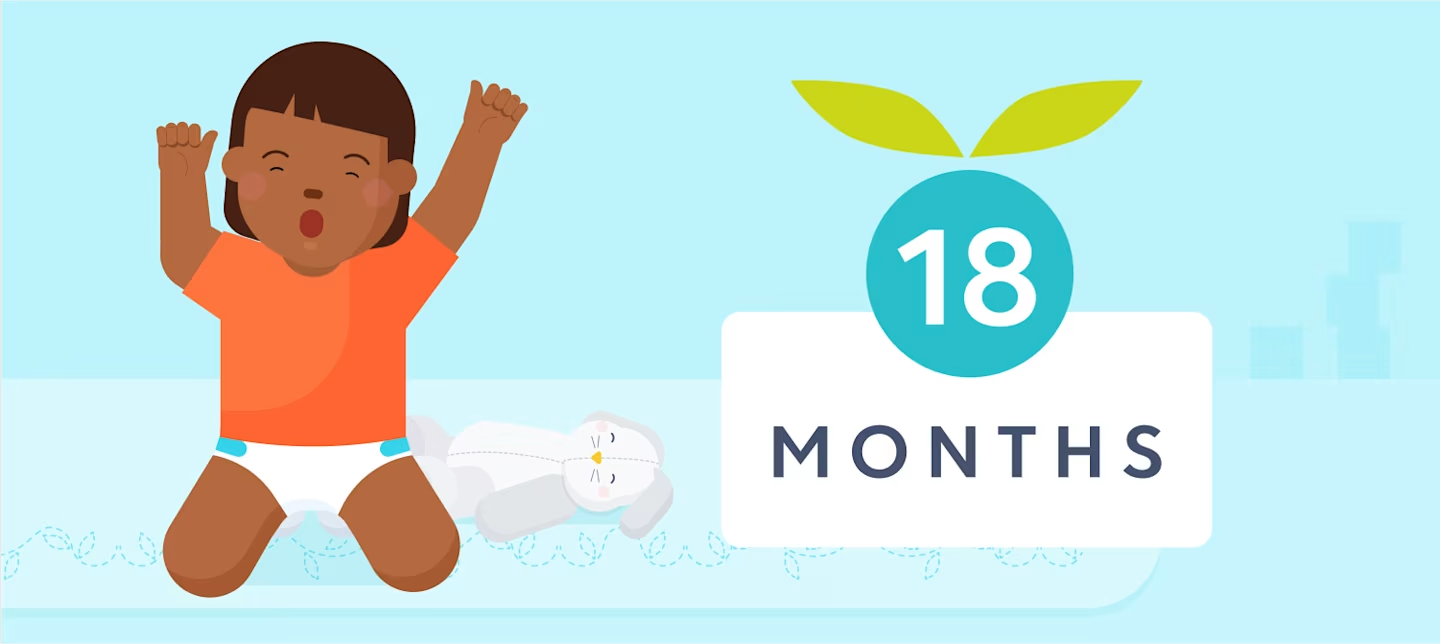
Happy half-birthday to your little one! 18 months can be an exciting time for parents and toddlers alike. Many 18 month olds are playful and energetic and just starting to understand that being silly can elicit a reaction. They often use this to their advantage, particularly at nap time!
Your not-quite-baby-but-somehow-almost-teenager may also be settling into a more predictable schedule now that they’re napping just once a day. This often makes getting out of the house and making plans much easier.
Read on to learn more about typical 18 month sleep schedules, creating healthy sleep habits, and how to navigate the so-called ” — a common phase where toddlers push back on sleep as they become more independent.
How much should an 18 month old sleep?
At 18 months, we recommend aiming for around 13 - 14 hours of total sleep per day. This usually looks like at least 11 hours of sleep overnight and 2 - 3 hours of sleep during the day. Getting enough sleep is essential for learning, memory, and behavior.
However, keep in mind that each child is unique and so are their sleep requirements. Don't get too caught up on hitting specific sleep hour targets — the suggested hours are simply a rough estimate. Keeping an eye on your toddler's mood and energy levels is another good way to make sure they're getting the rest they need.
Here's a quick overview of what you may expect when it comes to 18 month olds and sleep. Note that these figures are averages and should be used as guidelines.
Top sleep tip for 18 month olds
This is a common age to see bumpy sleep — you’ve probably heard of the “18 month sleep regression”— a term often used to describe the sleep challenges that can come with this stage of toddlerhood. While sleep regressions can happen at any age, many 18 month olds who previously slept well may experience new sleep challenges. Sleep regressions may include:
Fighting naps
Crying at bedtime
Difficulty falling asleep without help
Waking frequently during the night
Waking up early for the day.
You’re not the only one making bleary-eyed “how long can toddlers go without sleep” Google searches.
Toddler sleep regressions often stem from growing independence, teething, or a new wave of separation anxiety. While bedtime battles can be tough, staying consistent and patient goes a long way. Try to stick to your usual routines and encourage . If new habits form, don’t worry — they can be adjusted. With a solid sleep foundation, these rough patches usually pass quickly!
Sample 18 month old sleep schedule
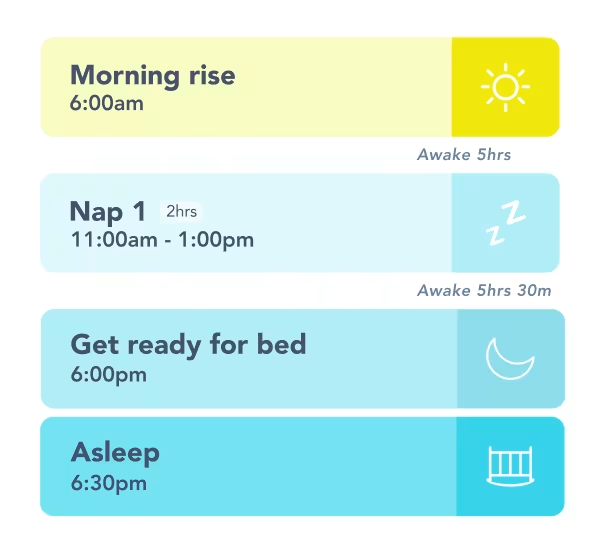
Note: Sleep needs vary by child and this chart should be viewed as an example.
Morning rise: 7:00 AM
Wake window before nap: 5 hours
Nap: 12:00 PM - 2:15 PM (2.25 hour nap)
Get ready for bed: 7:15 PM
Wake window before bedtime: 5.75 hours
Asleep: 8:00 PM
Naptime schedule for an 18 month old
A typical naptime schedule for 18 months includes in the middle of the day, about 5 hours after waking. If you’d like a more predictable nap schedule, consider waking your child within the same 30-minute window each day. This helps regulate their body clock and can help them feel ready for sleep at the same time each afternoon.
How long should an 18 month old nap?
Most 18 month olds tend to nap for 2 - 3 hours. However, if they’ve recently switched to one daily nap, it may take some time for the nap to lengthen. This is normal! If your child is still consistently napping for less than 2 hours each day, consider if they’re waking due to hunger or environmental factors, like loud noises, too much light, or room temperature.
If you suspect hunger could be the issue, try moving lunch to just before the nap. Consider offering milk with lunch and focusing on filling foods. To rule out environmental factors, we suggest darkening your child’s room using blackout curtains, playing continuously throughout the nap, and ensuring the room is at a comfortable temperature and they’re dressed appropriately.
How many naps for an 18 month old?
Most 18 month olds need 1 nap. If your child is struggling to make it to bedtime without becoming overtired, consider moving bedtime earlier (but no earlier than 6:00 PM) and/or moving the nap a bit later. We find that most toddlers this age do best with 5 - 5.75 hours of wake time in between their nap and bedtime.
1-nap schedule
Bedtime for an 18 month old
To help your child unwind and prepare for sleep, make the hour before bedtime calm and relaxing by dimming the lights. Spend the hour or so before bedtime leading your 18 month old through a nightly routine consisting of the same activities (like diaper change, PJs on, brush teeth, read a book, snuggles), in the same order. It's not always possible, but staying consistent whenever you can will help your toddler know what to expect and signals that sleep is on the horizon.
The blue light from TVs, tablets, and phones can interfere with melatonin production, making it harder for kids to fall asleep. Ideally, it helps to avoid screens in the hour before bed — but we know that’s not always realistic! If screen time happens, no worries. Focus on a calm, screen-free wind-down routine to help your child settle in for the night.
What time should an 18 month old go to bed?
Most 18 month olds thrive on a regular schedule with 11 – 12 hours of nighttime sleep and a consistent bedtime between 6:00 and 8:00 PM. If your toddler struggles to fall asleep, check their awake time before bed. Too little can lead to crib play and stalling, while overtiredness often leads to fussiness. The sweet spot is usually 5 – 5.75 hours of awake time, but some trial and error may be needed to find what works best for your little one right now.
Why does my 18 month old keep waking up at night crying?
Some factors that may be leading to more overnight wakes at 18 months include:
Seeking independence
Mastering milestones
Teething
Separation anxiety
Nap transition
Parent-led sleep associations
If you’re looking for more sleep support, consider submitting for a personalized, step-by-step Sleep Plan via .
Is there a sleep regression at 18 months?
While sleep regressions can happen at any age, is a common age when toddlers go through a patch of bumpy sleep. If your kiddo is newly resisting or skipping naps, waking early, and/or waking up more at night at this age, we’d call this a sleep regression. However, sleep patterns won’t go off the rails for all toddlers at 18 months — the date on the calendar doesn’t dictate sleep regressions. Instead, contributing factors like working on physical milestones and separation anxiety can lead to new sleep challenges at various stages of development.
Can my 18 month old sleep with a pacifier?
Many parents worry about the long-term effects of thumb-sucking. While extended thumb or pacifier use (beyond age 2–4) can impact teeth alignment and mouth development, this usually isn’t a concern until permanent teeth start coming in. Some experts recommend addressing the habit around age 3, while the AAP suggests most kids won't need treatment until age 5 [].
Can a 18 month old sleep on their stomach or side?
The AAP recommends beginning sleep on the back [], but by 18 months, it’s OK for your toddler to sleep on their stomach or side if they roll there on their own and can move both ways. Finding their own comfortable sleep position is typical at this stage.
Can I sleep train an 18 month old?
Yes, sleep training at (and older) can help your child learn to fall asleep without parental help. There are many ways to achieve this — some are gradual and take longer while others produce faster results and may have more tears upfront. However, this is typically short-lived. If you want to change how your toddler falls asleep, choose the sleep training method that fits your child and your parenting preferences – there isn’t a one-size-fits-all approach.
What are the developmental milestones for an 18 month old?
At , toddlers are learning and growing in exciting ways. They can typically walk independently and say a couple of words. Here are more things your kiddo may try at this age. However, all children develop at their own pace and it’s OK if your little one isn’t doing these things quite yet:
Walks without support
Runs stiffly (probably falling often!)
Can climb on and off small chairs
Says more than 3 simple words
Moves away from you to explore, but looks back at you for reassurance
Looks at books with you and tries to turn pages
Helps you dress them
Scribbles with a crayon or marker
Tries to drink from a cup with no lid (may spill sometimes)
Feeds themselves with a spoon or fingers
Follows one-step directions with no gestures
Points to show you interesting things
Does an 18 month old need to eat during the night?
Toddlers don’t usually need to eat overnight at . If you suspect your child is waking overnight (or starting their day too early) due to hunger, ensure they get enough calories during the day and try adding a filling snack (like yogurt or peanut butter and crackers) around 30 minutes before bedtime.
Takeaway
Most 18 month olds take one daily nap, totaling around 2 - 3 hours of daytime sleep. Most kiddos need around 11 hours of nighttime sleep at this age to be well-rested, but this varies.
It’s common for toddlers to go through new sleep challenges at this age due to factors like separation anxiety, teething, practicing new milestones, and receiving help to fall asleep. This is often called the “18 month sleep regression,” though rest assured not all children will experience bumpy sleep at this age.
Toddlers at this age can typically comfortably stay awake 5 - 5.75 hours at a time.
If you're curious about what lies ahead in the coming month, glimpse into the future to see what you might experience once your baby is on a . Also check out a to see how far your little one has come.
Share article:
Note: The content on this site is for informational purposes only and should not replace medical advice from your doctor, pediatrician, or medical professional. If you have questions or concerns, you should contact a medical professional.
2 Sources
Share article:
